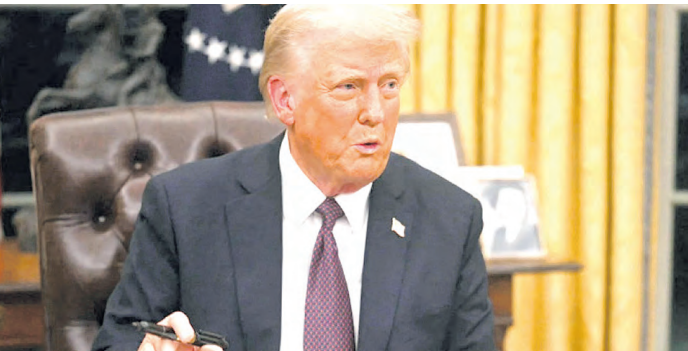

Over the years, African countries have relied heavily on American support to strengthen their health systems. The US decision to withdraw from the World Health Organization means these countries are facing a significant challenge.
Without alternative sources of funding, African nations risk suffering from the loss of crucial health assistance.
Moussa Faki Mahamat, Chairman of the African Union Commission, has acknowledged the potential impact of the US decision on the continent.
He urged US President Donald Trump to reconsider, warning that the withdrawal would disrupt vital programmes, such as the Africa Centers for Disease Control and Prevention.
The CDC is a critical technical agency that works with WHO to detect, prepare for and respond to public health emergencies and pandemics across the continent.
Additionally, key health programmes addressing diseases like HIV/Aids, tuberculosis and malaria — which have long been funded by initiatives such as PEPFAR (The President’s Emergency Plan for AIDS Relief) — will be severely impacted.
Without American support, African nations will need to identify new partners to fill the funding void and maintain critical health interventions.
In recent years, the relationship between Africa and China has evolved as the Asian giant offers significant support through investments in infrastructure and economic development.
At the Ninth Forum on China-Africa Cooperation summit in September 2024, President Xi Jinping outlined 10 key action plans to advance the partnership.
They cover areas such as trade, industrial cooperation, connectivity, health, agriculture and security. If fully implemented, these initiatives could help address the economic challenges African countries face, particularly those exacerbated by the Covid-19 pandemic.
Through Focac and the Belt and Road Initiative, China has been instrumental in supporting African nations with infrastructure projects, offering not only funding but also expertise and technology.
This growing relationship presents a valuable opportunity for China to extend its support to the African health sector, especially as the US plans to end its involvement in WHO. Africa’s health systems are already vulnerable and US withdrawal will worsen the situation.
This is an opportune moment for China to step in and provide much-needed support. In response to the challenges posed by the pandemic, China expressed its continued commitment to supporting the WHO.
China’s Ministry of Foreign Affairs said it recognises the central role the WHO plays in global health governance and has pledged to deepen international public health cooperation, strengthen global health governance and promote building a global community of health for all.
China’s involvement in previous health crises further demonstrates its potential to assist. During the 2014 Ebola outbreak in West Africa, China provided aid to the affected countries, sending health workers and medical supplies.
In 2016, China sent public health workers to Angola to help combat the yellow fever outbreak and in 2017, it sent teams to Madagascar to control a plague outbreak.
China’s support was also instrumental in addressing the Ebola epidemic in Uganda and Burundi from 2018 to 2020.
Moreover, China’s Public Health Engagement has been critical in providing global supplies such as vaccines, medicines and medical expertise.
China has also provided vital health technologies to Africa. Chinese biopharmaceutical companies have produced and supplied antimalarial drugs based on artemisinin extracted from the sweet wormwood plant.
China’s Sino Implant (II) male contraceptive technology has been distributed widely across Africa. These efforts show China has the capacity to make significant contributions to public health in Africa.
The US withdrawal underscores a critical lesson for Africa: the risks of overreliance on foreign donors. It’s essential for African nations to strengthen their own health systems, reducing dependency on external sources of funding. This presents an opportunity for African governments to prioritise building sustainable health systems and ensuring public health funding is more internally mobilised.
As African leaders prepare for a key meeting in February 2025, chaired by Rwandan President Paul Kagame, they should explore alternative sources for health funding.
Engaging with China, along with other willing nations, will be crucial in strengthening Africa’s health systems. The leaders should also discuss ways to make Africa more self-sufficient in addressing health issues, reducing its reliance on foreign aid.
Given China’s longstanding support for Africa’s development, it’s time to refocus the relationship on resource mobilisation for health.
China has already provided substantial support in the form of funding, equipment and medical expertise. With the US repudiating and leaving the WHO, there is a clear opportunity for China to step up its involvement, helping African countries meet their public health needs. Africa’s health systems are at a crossroads.
Without strong health systems, Africa’s economic growth will remain limited. The US departure from WHO creates a funding gap that will undermine the battle against diseases such as HIV/AIDS, tuberculosis and malaria.
As the continent grapples with these challenges, China has the potential to play a more vital role in supporting Africa’s health initiatives.
By deepening cooperation in public health, infrastructure and economic development, Africa and China can work to create a more prosperous and healthier future for the continent.
ONYANGO
K’ONYANGO, Journalist and
communications
consultant







